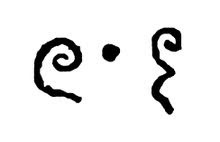Zero is the point when reckoning begins. In mathematics it is a number meaning nothing.
Records show that the ancient Greeks seemed unsure about the status of zero as a number. They asked themselves, "If you don't have anything, why do you need a number?", leading to philosophical arguments about the nature and existence of zero.
The Mayan civilisation constructed quite early a very sophisticated number system, possibly more advanced than any other in the world at the time. It included one of the earliest instances of the explicit zero in the world, which they represented as a shell shape.
The concept of zero as a digit in the decimal place value notation was developed in India, The earliest text to use a decimal place-value system, including a zero, was the Lokavibhāga, a Jain text from the mid fifth century.
In the Medieval period there were religious arguments about the nature and existence of zero. Zero and negative numbers were banned in Florence in the 13th century because they were considered a thing of the devil.
Although mathematicians have used zero since at least the 8th century, the word 'zero' was first recorded in English only in 1604.
When he published his equations of general relativity Albert Einstein failed to notice that his theory predicted an expanding universe. Alexander Friedmann, a Russian mathematician, found to his amazement Einstein had made an elementary algebraic error that caused him to overlook a solution to his own equations. Einstein had divided by zero at one point in his calculations, a mathematical impossibility.
Humans are unable to burp in zero gravity environments.
Honeybees, despite having the brain size of a sesame seed, can understand the concept of zero.
In English, zero quantities are plural by default. Therefore you shall write "0 results found", "I have found no results".
Originally written for Songfacts
Records show that the ancient Greeks seemed unsure about the status of zero as a number. They asked themselves, "If you don't have anything, why do you need a number?", leading to philosophical arguments about the nature and existence of zero.
The Mayan civilisation constructed quite early a very sophisticated number system, possibly more advanced than any other in the world at the time. It included one of the earliest instances of the explicit zero in the world, which they represented as a shell shape.
The concept of zero as a digit in the decimal place value notation was developed in India, The earliest text to use a decimal place-value system, including a zero, was the Lokavibhāga, a Jain text from the mid fifth century.
 |
| The number 605 in Khmer numerals, from a 683 AD inscription. Early use of zero as a decimal figure |
In the Medieval period there were religious arguments about the nature and existence of zero. Zero and negative numbers were banned in Florence in the 13th century because they were considered a thing of the devil.
Although mathematicians have used zero since at least the 8th century, the word 'zero' was first recorded in English only in 1604.
When he published his equations of general relativity Albert Einstein failed to notice that his theory predicted an expanding universe. Alexander Friedmann, a Russian mathematician, found to his amazement Einstein had made an elementary algebraic error that caused him to overlook a solution to his own equations. Einstein had divided by zero at one point in his calculations, a mathematical impossibility.
Humans are unable to burp in zero gravity environments.
Honeybees, despite having the brain size of a sesame seed, can understand the concept of zero.
In English, zero quantities are plural by default. Therefore you shall write "0 results found", "I have found no results".
Originally written for Songfacts

No comments:
Post a Comment